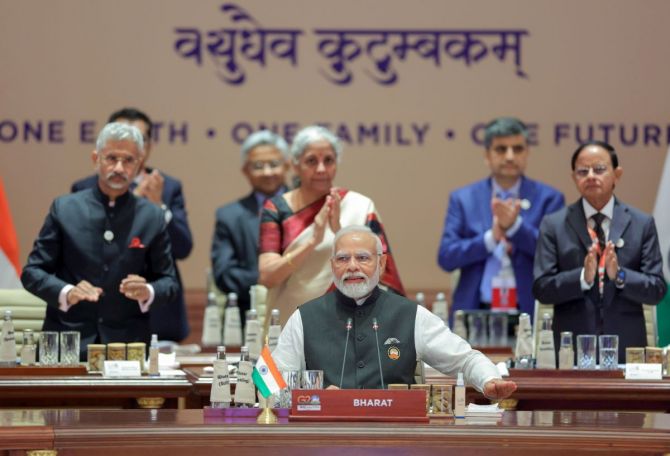In an unexpected early breakthrough and success for India’s Presidency, G-20 members agreed to a joint statement, forging consensus on the contentious “Ukraine paragraphs”, and also accepted the membership of the African Union into the grouping on Saturday. The final document marks a shift in the position taken by the U.S., the European Union, and G-7 countries and dilutes the harsh criticism of Russia contained in last year’s Bali G-20 statement. Diplomats and officials said the final breakthrough followed a proposal by Indonesia, India, Brazil, and South Africa that was negotiated until past midnight on Fridayand again on Saturday. The development was announced directly by PM Narendra Modi.
External Affairs Minister S. Jaishankar and India’s G-20 Sherpa said the consensus had come about due to the stand taken by Indonesia, India, Brazil, and South Africa, consecutive hosts of the G-20. Japan, as the current president of the G-7+ EU bloc, also played a role in bridging the differences.
The declaration of 83 paragraphs, which included eight paragraphs on the Ukraine war and its resultant economic impact, contained many agreements as a part of the Finance Track. Highlighting an agreed plan to strengthen multilateral development banks, a way forward for regulating crypto currencies, and the use of digital public infrastructure for financial inclusion as major gains, along with a faster debt distress plan for vulnerable countries, Finance Minister Nirmala Sitharaman said the Indian G-20 Presidency had “walked the talk”.
On climate change, the declaration included a “quantum jump” in climate financing from billions of dollars to trillions of dollars, noting the need for “$U.S. 5.8.–5.9 trillion in the pre-2030 period for developing countries as well as $U.S. 4 trillion per year for clean energy technologies by 2030 to reach net zero by 2050”. The G-20 nations resolved to increase women’s participation and leadership in climate change mitigation and adaptation and support gender-responsive solutions to build resilience to its impact. Check out the full declaration here.
The BJP lauded India’s G-20 Presidency and said the adoption of the New Delhi Declaration was a success for India’s diplomacy and foreign policy. Meanwhile, playing on the G-20 slogan “One Earth, One Family, One Future”, the Congress attacked the government for allegedly promoting industrialist Gautam Adani and shielding him from repercussions. Globally, China finally backed the New Delhi Declaration and reaffirmed its recent calls for the grouping to stay away from “geopolitics”.
Earlier in the day, Mr. Modi announced the G-20’s decision to include the 55-nation African Union, the second regional bloc to join the G-20 after the European Union. India and Saudi Arabia also joined the European Union and the U.S. to launch the Partnership for Global Infrastructure and Investment (PGII) and the India-Middle East-Europe Economic Corridor. On the sidelines, India launched the Global Biofuels Alliance, with PM Modi urging G-20 nations to join the initiative with a plea to take the blending of ethanol with gasoline to 20% globally. India and the U.K., meanwhile, agreed to continue to ‘work at pace’ towards a free trade agreement.(The Hindu)





